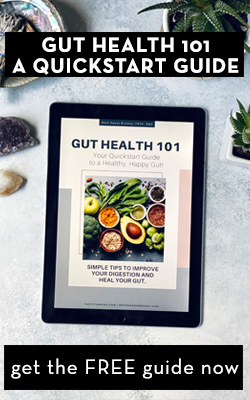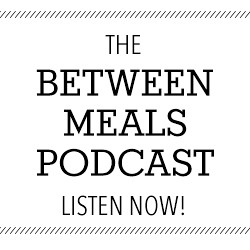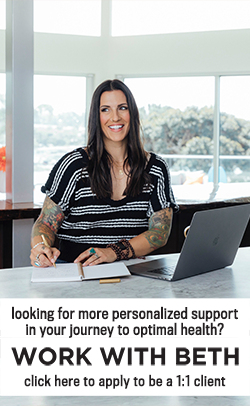8 Tips to Help You Stick with Your New Year’s Resolutions, Intentions and Goals. I’m sharing these key mindset tips and strategies to help you shift your approach to change from shame or guilt and move from a place of love, compassion and kindness for yourself and all of the amazing things you are capable of achieving!
I am not at all of the mindset that January 1st is a time for deprivation, detoxes and cleanses to rectify our recent holiday “sins”. Resolutions for so many become less about the fresh start of a New Year with limitless potential and rather come littered with restriction, often rooted in negativity. I’ve been there myself, it rarely ends well.
There is this collective pressure in the air right now, especially amongst the wellness community, to indulge the feelings of guilt and shame of our “wrong-doings” and to use these as fuel to rewrite a New Year by treating our body to some good ‘ol fashioned torture. It’s not only not necessary, it’s not at all effective. Guilt and shame do not fuel our desire to be better and make better choices, rather the opposite is true.
Guilt and shame about a bad habit can often make people feel so bad that they seek to make themselves feel better—by indulging in the very habit that made them feel bad in the first place.
By contrast, people who feel less guilt and who show compassion toward themselves in the face of failure are better able to regain self-control — and therefore, they’re able to resist indulging in the bad habits that make them feel bad. 1https://gretchenrubin.com/2014/08/the-penalty-for-a-bad-habit-the-bad-habit/
Positive Intentions and Sustainable Goals
All that said, I certainly think with a little mindset shifting, it is more than possible that we can utilize the wonderful opportunity of a fresh New Year to set positive intentions, to create goals, begin the process of implementing new habits and introduce lifestyle changes that become an ongoing process as part of a lifetime plan to prioritize our health, happiness and well being. I believe it’s more about the process not perfection or the outcome.
It’s estimated that between 812https://www.ncbi.nlm.nih.gov/pubmed/2980864 and 923https://www.statisticbrain.com/new-years-resolution-statistics/ percent of Americans fail to achieve the resolutions they commit to on New Year’s Day. Rather than setting unrealistic, lofty New Year’s Resolutions that come with a set of rules focused around negativity, why not make a commitment to simply prioritize your health by setting positive intentions and goals that support a sustainable and healthy lifestyle, body and mind? These changes are often an ongoing process, and not something you can achieve overnight or even in a few weeks. Rather, it’s a lifetime plan that you stick with over the long haul.
“It’s easy to change your attitude but difficult to change your behavior,” explains Christine Whelan, PhD, clinical professor in the School of Human Ecology at the University of Wisconsin, Madison. “If you’re committed to it, however, you can make a new habit or behavior permanent.”
Phillippa Lally, a health psychology researcher at University College London, published a study in the European Journal of Social Psychology 4http://onlinelibrary.wiley.com/doi/10.1002/ejsp.674/abstract, where she and her research team decided to figure out just how long it actually takes to form a habit. On average, it takes more than two months before a new behavior becomes automatic — 66 days to be exact. And how long it takes a new habit to form can vary widely depending on the behavior, the person, and the circumstances. In this study, it took anywhere from 18 days to 254 days for people to form a new habit. This isn’t to discourage you, but more to inspire you to not to get down on yourself if you try something new for a few weeks and it doesn’t become a habit instantly. It’s also helpful to know we don’t have to be perfect and that we need to embrace the process. Ultimately it doesn’t matter how long it takes to become a habit you have to put in the work, either way.
Self-Love
I do think it’s important to note, that while change isn’t by any means required or necessary as we enter a New Year and who you are right now is already enough – growth, shifting, and expansion are all just some of the many positive results we can expect when we embrace change, especially when the change comes as we prioritize our health and well-being! If you wish to elicit change for yourself in this New Year, I find it’s imperative to venture into these goals with intention and always doing so from a place of self-love and knowing that you are beyond worthy of living your very best life and feeling the best that you can, always!!
If you love yourself enough to set mindful and intentional goals for yourself, every single decision that you make has the potential to get you one step closer to living your most nourished, happy and healthy life!

Here are a Few Strategies to Help You Stick with Your New Years Resolutions, Goals and Intentions for the Long Haul:
1) Make a Plan, But Be Specific.
Whatever your focus for a sustainable and healthy New Year, setting vague goals and restrictive resolutions often leaves room for confusion on when the goal is actually being met. “Eat better”, “make more friends”, “workout more”, “donate and give back” “disconnect”. These end up being very BIG goals due to being not very specific. Try instead to be more specific and concrete with smaller, positively-focused goals like “eat leafy greens at least twice a day” “drink 70 oz of filtered water every day” “reduce refined sugar” “start a meet-up group” “go to the gym at least 3 times a week” “join the local mission and feed the needy in my community” “turn off my phone by 8pm and don’t bring it to the bedroom”.
Because the latter are actually actionable– you either did it or you did not do it. Having specific goals helps to hold you more accountable and it lessens the grey area and the space for wiggle room. Accountability and the ability to measure success are both key in achieving goals.
2) Try Not to Be Too Unrealistic, Rather Seek to Set Goals that You Can Actually Keep.
Having goals that are too far out of reach can leave you feeling defeated and discouraged. Instead of totally and completely overhauling your diet all at once, cold turkey, with massive, unsustainable restriction for 30 days and then likely immediately shifting right back to where you were before you began, try instead to slowly ease into the shifts. Start making small but mindful and actionable changes you can keep. Making these small, incremental improvements — rather than pressuring yourself into thinking that you have to do it all at once will work along with you in developing new habits that you can actually hope to keep for longer than the duration of any short restriction-based program. Implement these small improvements over a few weeks before going all in.
Then, if you decide a full-blown, guided program (be it, nutrition or fitness, whatever) is what will work for you personally to hit the goals you have set, if you like having a set of rules to follow, go into it with the mindset that this is a wonderful time and space for learning. Use this as an opportunity to listen to your body, learn more about how you personally manage expectations and rules and take these lessons with you as you move forward beyond that scheduled time and into the rest of your life. This allows us to actually form habits that will stick with us vs. simply being “on” or “off” a plan.
3) Don’t Just Dial It In, Either.
On the contrary, creating goals that are too easy can also be defeating in their own right, because these won’t challenge you and your potential and accomplishing them won’t provide the same satisfaction as it would if you really worked hard for it. Try to find a healthy medium between attainable and challenging when setting your health goals.
4) What is Your Why?
Whatever your goals, intentions or resolutions, understanding the reasons behind your goals will help you stay motivated to reach them. Clarity of purpose challenges you to do better and commit to actions that get you closer to what you really want in life. When you determine and understand your WHY, you’ll be able to clearly articulate what makes you feel fulfilled and to better understand what drives your behavior when you’re at your natural best. You’ll have a point of reference for everything you do going forward. You’ll be able to make more intentional choices that move you closer torward your purpose, will help you fulfill your vision and set and reach new goals.
5) Don’t Strive for Perfection.
While the objective is to set intentions and goals that we can actually keep, it’s also not fair to think we can always be perfect. It’s unrealistic. Often when people feel as if they’ve failed, they tend to just throw in the towel for good instead of giving their health goal another shot. Just because you break your resolution or goal, doesn’t mean that you have to give it up for good. Try again the next day.
“Don’t let the perfect be the enemy of the good.” – Voltaire.
Researchers studying habit formation have found that “missing one opportunity to perform the behavior did not materially affect the habit formation process.”5http://onlinelibrary.wiley.com/doi/10.1002/ejsp.674/abstract In other words, it doesn’t matter if you mess up every now and then. Building better habits is not an all-or-nothing process. Try instead to treat failure like a scientist6https://jamesclear.com/failure-scientist conducting experiments, give yourself permission to make a few mistakes, and from those moments of misstepping, develop strategies for getting back on track quickly. Your failures are simply data points that help guide the next experiment.
6) Practice Kindness.
By setting intentions and goals, you are committing to yourself to carry out these actions and by setting yourself up to be most successful the hope is that you can actually achieve what you set out to. That said, things change, we change and having goals and intentions that can shift and grow with us, as needed, is an important part of the process. Because, after all, it’s not always going to be sunshine, rainbows and unicorns and we need to remember to practice kindness and compassion with ourselves always, but most especially when things don’t go our way.
7) Believe You Can.
You cannot be successful at anything, if you don’t fully believe that you can be. It is an essential component of your success. If you don’t believe that you have the power to reach whatever goals and intentions that you set for yourself, I would encourage you to first deal with these issues and where they may stem from, before you set off with your intentions to create major shifts.
8) Learn and Understand Your Tendency.
Gretchen Rubin developed “The Four Tendencies“, a personality framework that divides all of humanity into four types, based on her research of habits and how we respond to expectations and it has been highly effective for me personally in implementing new goals for myself. Once you learn and understand your tendency (you can take the quiz here), it may help you in being able to better understand how given your response to expectations (both internal and external) you can create the life you want. This understanding allows us to create the situations in which we will thrive and be successful, rather than watching someone else’s success, mimicking it and feeling discouraged when it doesn’t work the same for us. It’s important to know that what works for one person may be the very opposite of works for another!
For more tips and ideas on creating new habits and taking small steps, listen to this amazing podcast episode with James Clear, How to Make Tiny Changes, Master Your Habits and Live Your Best Life.
I hope these tips help get you started for setting your positive goals and intentions to begin the New Year from a place of positivity, with love and compassion for yourself and all of the amazing things you are capable of achieving!
I’d love to hear from you.
Comment below and share what your personal goals are for the new year and if you have any additional tips or ideas that have helped you to be successful with your resolutions or goals in the past!
References
| 1. | ↑ | https://gretchenrubin.com/2014/08/the-penalty-for-a-bad-habit-the-bad-habit/ |
| 2. | ↑ | https://www.ncbi.nlm.nih.gov/pubmed/2980864 |
| 3. | ↑ | https://www.statisticbrain.com/new-years-resolution-statistics/ |
| 4, 5. | ↑ | http://onlinelibrary.wiley.com/doi/10.1002/ejsp.674/abstract |
| 6. | ↑ | https://jamesclear.com/failure-scientist |















5 Responses
I love this!! This is so inspiring!
Decided to change my mindset this year to something more realistic for me!
No more black and white concept but gradually going to white – well really, or off-white 😉
This time, I plan to break-down my goals and spread them by month!
I want to make better food choices, get ride of gluten, dairy, sugar, and increase veggies, bone broths, fish etc.
So January, I will focus on increasing greens. February, I will continue with the greens, but add bone broth etc..
Same thing with my 2 other goals: Reduce spending & practice self-love
Excited for 2018!!
Thank you so much. I am so so happy to hear that this resonated with you. I love your plans and your approach. I love hearing that you are prioritizing your health and doing so from a place of love, kindness and with so so much compassion. I wish you so much love on your journey and best wishes for an amazing year ahead!! xoxox
Thanks for this post, especially “don’t strive for perfection”. Perfection isn’t a reasonable expectation for something we’re going to do long term. Another couple of ideas for sticking with things longer term…The single most effective tactic I’ve found is checking in with another person every day. For example, a buddy and I text each other daily to say what exercise we did. Key is to keep it as light weight as possible…”30 min trail run, 3×10 pushups” is an example. Another one is to understand that motivation is like a wave. Expect it to come and go and have a plan for what to do when it’s pushing you (ramp up the intensity of workout/healthy eating/etc) and when it isn’t (dial back your thing) and count doing your dialed back versions just as much a success as your ramped up versions. And on days that you miss on working out or eating healthier or whatever, remember that your attention is like sunshine – whatever you shine it on will grow. The only thing that matters at that point is what you do the next day. Shine all of your attention there (and none of it on the miss) and you will give yourself a better shot at getting right back on track. I think and write about creating a healthy smoothie habit over on my site but most of the strategies, tactics, and mindsets can be applied to any new habit you want to start. Good luck!…and happy new year 🙂
first of all, thank you so much for this post! i just finished listening to your podcast with stephanie on harder to kill and it got me to my core: so relatable and inspiring. i’m a therapist and part of my job is writing goals, both short term and long term, for my patients to get where they want to be so i’m going to approach this year in that type of strata.
my long term goal for 2018 is going to be for me to learn how to love myself (after 30 years of being on this earth) with short term goals being stepping stones to achieving the bigger process. first short term goal is going to be finding a therapist so i can help explore the negativity i have surrounding my self esteem/seeking perfection/feels of failure and grow from that process as i think i need outside, neutral support for this one as it’s been a lifelong struggle. second short term goal is to finish a whole30 for the month of january to get a kick start on my nutrition and third goal is to get my ass to the gym 3x/week–someone’s gotta put them new yoga pants to work! once those goals have been met, i’ll build on them to see what the next step is in my health and healing journey! your ass is mine, 2018.
Love! Love! Love!❤